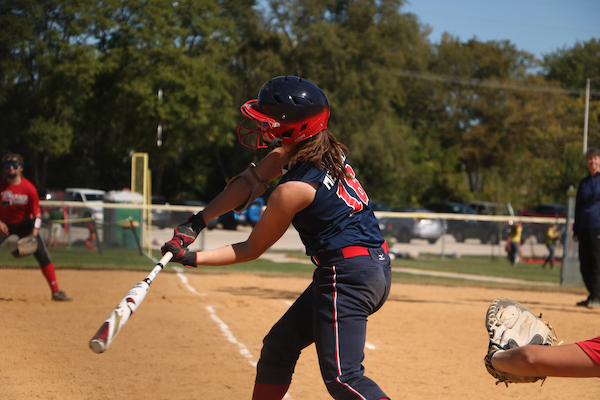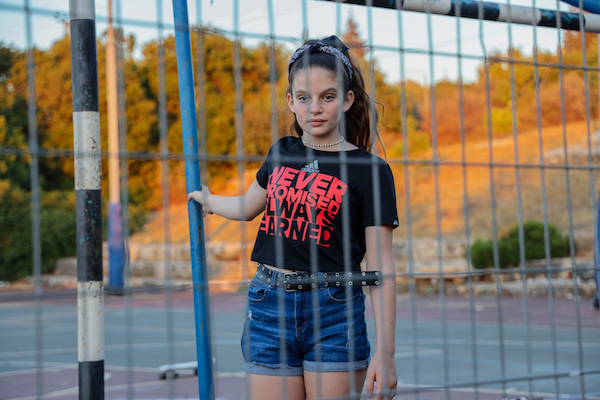Remember the old nursery rhyme that said, “What are little girls made of? Sugar and spice, and everything nice?”

Growing up, my older sister was really into ballet and cheerleading. My sister is petite. She had long, silky hair, and she consistently put great effort into how she dressed. Even at a young age, I thought my sister was the essence of femininity. I looked up to her, and I often wished that I was more like her—pretty, petite, graceful, and appealing to the opposite sex—but my sister’s feminine world also felt completely foreign to me.
I had no interest in ballet or cheerleading. I had a much bigger frame than my sister—I was thin but much taller, and what one of her boyfriends described as “big-boned” (at least in comparison). While I thought my sister’s version of being female was the role that I should fill, it didn’t feel natural to me. I was awkward and clumsy. I had Barbie dolls, but I enjoyed playing with my brother’s toy cars more. And I loved to play sports. I played basketball, softball, football, field hockey, tennis, dodgeball… Basically, if there was a game that involved running around and using my strength, I wanted to participate (even if I was terrible at it).
At a young age, I knew the contrast between how my sister and I expressed our female gender.
It reminded me of the old nursery rhyme—what are little girls made of? Well, if that rhyme was to be believed, at least from the outside, she was the sugar and I was most certainly the spice.
In my elementary school gym class, we would test feats of strength, like sprinting across the yard, or climbing a rope, or holding our weight on a bar. I could never do a cartwheel like so many other girls in my class, but I could lift my body weight for a really long time. I was strong, and I was fast.
By the 5th grade, the school playground evolved into a battleground. The boys would claim the best equipment as their victory, and exclude the girls from whatever area they controlled. As one of the tallest and strongest girls, I became a designated defender of our space. If any girls were bullied off a piece of equipment, they would run to me and ask for help. I would stroll up in defiance, and threaten the boys, “or else!” Aggression was a language the boys understood. Being an aggressive girl made me equal parts ally and outsider.
Perhaps I didn’t project a typical depiction of femininity, but I found strength in my female gender, and I wasn’t afraid to use it.
By middle school, I was playing a handful of different sports, and I loved to use the exercise room for strength training. I wanted to bench press weights, something no other girl was vying to do at that time, but there was a rule—you could only use the bench after proving you could lift a minimum weight. This made sense to me as a safety measure. I had a bench at home and lifted safely there until I could meet the requirement. When I showed my male gym teacher that I could lift the required weight, he was not impressed. He admitted that I met the requirement, but insisted I could not use the bench. The thing is, no boys were excluded from using it, so I was incensed. How could that be anything be sexist?
So, I did the next logical thing, and I asked to join the wrestling team.
This was a defining moment in my youth, as the constraints and expectations of what it meant to be a female finally set in.
I was expected to have more feminine interests, something a bit sweeter than lifting weights or wrestling. By now, most of the young girls in my class were transitioning into womanhood, getting their first period, and developing breasts. I realized wrestling was prohibited to me because there was fear in seeing a developing girl and boy touch each other in ways that might otherwise seem inappropriate. And, I think, they were afraid of my spice.
While I lost my battle for inclusivity then, just one year later, two female students were allowed to join the wrestling team. I’m not sure what transpired to make that happen, but as you might imagine, I was quite proud.
Despite my desires for gender equality, I still had plenty of standard grade school crushes, where I meekly fawned for the affection of some “too cool for school” boy. I discovered quickly that those boys weren’t particularly interested in my “tomboy” type, so in 7th grade, when my mom took me school shopping, I decided to outfit myself with unmistakably feminine clothing (skirts, dresses, heels). I didn’t want boys to see me as just a playground defender or jock athlete. There was more to me, after all. I just needed to tap into that sugary side of my gender.
For a long time growing up, I was envious of boys.
They could play any sport they wanted. Being strong was celebrated. They didn’t obsess over finding the right hair clip, or the right barrel curling iron. They barely had to even brush their hair. They didn’t care about makeup or nail polish. They didn’t worry about the right outfit or finding the right fitting bra. And they certainly didn’t worry about bleeding for a week each month. Gender inclusivity was rarely a concern for them. While I understood that becoming a man came with its own challenges, there were so many perceived advantages.
From the moment girls enter this world, with our decidedly pink clothing and our “sugar and spice” nursery rhyme, we are raised as separate and distinct from boys. Even in the best of gender-neutral homes, our chosen genders and our physical bodies inevitably place females in a disadvantaged category. In countless ways throughout our formative years, we are told or made to feel as though we are the lesser or weaker sex… even when we simply want to lift some weights. It can be exhausting.
But it can also be empowering because whatever we endure in the process of becoming a woman, none of that actually makes us weaker. All of that exclusion, and undermining, and physical pain we endure—all of that makes us stronger. Maybe that is why I always related more to the spice than the sugar in that nursery rhyme because I always felt ready to channel that strength. I knew I had resilience and power when it was needed.
In becoming a woman, I’ve learned to embrace the sugar with the spice.
I still like to get my hands dirty. I like to play sports. I like camping and beer, and loud music. And I might just like my son’s Hot Wheels more than he does. But I also like the color pink. I like makeup. I like to do my hair, feel pretty, and wear form-fitting clothing. And honestly, what kind of world would this be without sequins? No one aspect defines my womanhood. No one nursery rhyme can encapsulate it either.
I didn’t see it when I was a little girl, but even my petite, ballet-loving, cheerleading sister had her fair share of spice. (Seriously, don’t mess with her, she is fierce.) So, I think it is high time we let go of the old sugar and spice-based depiction of femininity, and replace it with something more dynamic and reflective of our reality. Maybe I was more spice than sugar growing up, but really I think I was a lot of things that a simple nursery rhyme could never convey. Instead of raising our girls with a false or inadequate depiction of femininity, or dictating what our girls are made of, let’s just let them decide for themselves, shall we?












